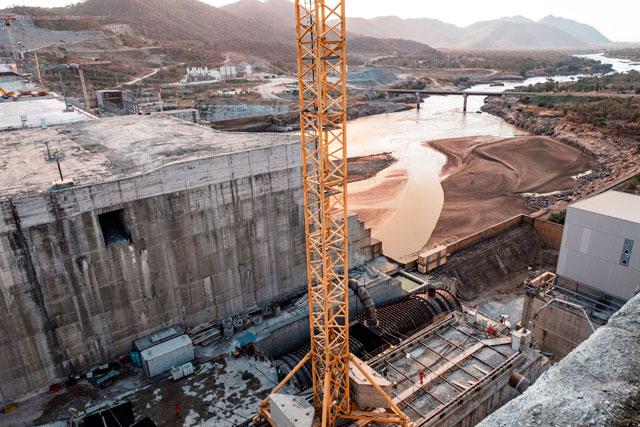You are here
Power-starved Ethiopia rallies around Nile Dam as Egypt dispute simmers
By AFP - Jan 07,2020 - Last updated at Jan 07,2020

A general view of the Blue Nile River as it passes through the Grand Ethiopian Renaissance Dam, near Guba in Ethiopia, on December 26, 2019 (AFP photo)
METEKEL, Ethiopia — Cell phone batteries constantly dying, health centres bereft of modern equipment, a dependence on flashlights after sundown — Kafule Yigzaw experienced all these struggles and more growing up without electricity in rural Ethiopia.
So five years ago, he leapt at the chance to work on a project designed to light up his country and the wider Horn of Africa region: The Grand Ethiopian Renaissance Dam, a 145-metre-high, 1.8-kilometre-long concrete colossus that is set to become the largest hydropower plant in Africa.
“Our country has a huge problem with electricity,” Kafule, 22, told AFP recently while taking a break from reinforcing steel pipes that will funnel water from the Blue Nile River to one of the dam’s 13 turbines.
“This is about the existence of our nation and, in my opinion, it will help us break free from the bondage of poverty.”
The dam is expected to begin producing energy by the end of this year.
Across Ethiopia, poor farmers and rich businessmen eagerly await the more than 6,000 megawatts of electricity officials say it will ultimately provide.
Yet as thousands of workers toil day and night to finish the project, Ethiopian negotiators remain locked in talks over how the dam will affect downstream neighbours, principally Egypt.
The next round of negotiations starts Thursday in Ethiopia’s capital, Addis Ababa, and is likely to renew focus on Cairo’s fears that the dam could bring water and food insecurity for millions of Egyptians.
Ethiopians at the dam site say they are doing their best to focus on the task at hand, though they bristle at suggestions that their country is overstepping in its bid to harness the Blue Nile for its development.
“When we do projects here it’s not to harm the downstream countries,” said Deputy Project Manager Ephrem Woldekidan. “There is no reason that the downstream countries should complain [about] it because this is our resource also.”
Rising Nile tensions
The Nile River’s two main tributaries — the Blue and White Niles — converge in the Sudanese capital Khartoum before flowing north through Egypt toward the Mediterranean Sea.
Egypt depends on the Nile for about 90 per cent of its irrigation and drinking water, and says it has “historic rights” to the river guaranteed by treaties from 1929 and 1959.
Tensions have been high in the Nile basin ever since Ethiopia broke ground on the dam in 2011.
The International Crisis Group warned last March that the countries “could be drawn into conflict” given that Egypt sees potential water loss as “an existential threat”.
In October, Ethiopian Prime Minister Abiy Ahmed, fresh from winning the Nobel Peace Prize, assured lawmakers that “no force can stop Ethiopia from building the dam” and said “millions” of troops could be mobilised to defend it if necessary.
The United States stepped in to jumpstart a tripartite dialogue with Sudan that is supposed to resolve the dispute by January 15.
The biggest initial hurdle is the filling of the dam’s reservoir, which can hold 74 billion cubic metres of water. Egypt is worried Ethiopia will fill the reservoir too quickly, reducing water flow downstream.
After the latest round of talks in Sudan last month, Sudanese irrigation minister Yasser Abbas said there had been “progress” on the issue but no breakthrough.
Kevin Wheeler, an engineer at the University of Oxford who has studied the dam, said he was hopeful a deal on the filling period could be reached by January 15, but that additional issues would emerge down the line.
“Coordinated operations between the reservoirs along the Nile are likely to be an ongoing discussion that may continue for years, decades, and centuries to come, particularly as populations grow, development continues, and global climate patterns continue to change,” Wheeler said.
Ethiopia’s
push
for power
Thousands of farmers have allegedly been displaced since work on the dam began.
The US-based NGO International Rivers has accused Ethiopia of disregarding the dam’s environmental impacts, which remain understudied.
The group has voiced concern about “great degradation” that, along with changing weather patterns due to climate change, could “result in irregular episodes of flooding, drought and mudslides”.
Ethiopia has responded to such statements by noting that a study group including experts from Ethiopia, Egypt and Sudan has been tasked with assessing social and environmental impacts.
Meanwhile, officials in Addis Ababa are focusing on the country’s push for power.
Ethiopia is striving for universal electricity access by 2025, though currently more than half the population of 110 million lives without it.
Even in Addis, power is patchy, and the city suffered weeks of blackouts during the most recent period of electricity rationing in May and June 2019.
Dawit Moges, head of a medical laboratory, said the cuts drove up his generator costs and, because they were not predictable, led to delayed results and unreliable blood sample readings.
“You’ve collected specimens, you’re processing the specimens and boom, there is no power. All those specimens, you may not be sure about the results,” he said, adding that he hoped the dam would yield a steady power supply.
“I want it to be completed as soon as possible and go into production.”
The same is true for Harsh Kothari, head of Mohan Group, which runs five manufacturing units producing everything from shoes to electric cables and barbed wire.
Reliable electricity would make his business “a lot more competitive” and enable it to grow, Kothari said.
Back at the dam site, this kind of talk about how the project could fuel prosperity from farms to factories across Ethiopia is exactly what motivates Workey Tadele, a radio operator, to go to work every day.
“We’re working here for the benefit of our country,” she said. “If we have electricity, then we’ll have a better future.”
By Robbie Corey-Boulet
Related Articles
KHARTOUM— Sudan warned on Sunday it cannot continue the "vicious cycle" of negotiations with Egypt and Ethiopia in the long-running dispute
ADDIS ABABA — Ethiopia on Saturday expressed "disappointment" with the latest push by the United States to resolve a long-running dispute ov
ADDIS ABABA — Ethiopia said on Tuesday that its first-year target has been reached for filling a mega-dam on the Blue Nile River that has st














